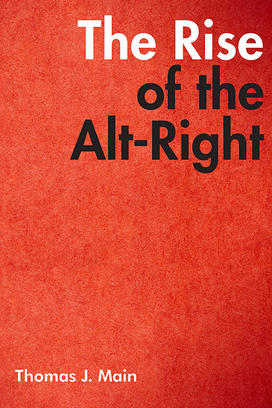Thomas J. Main *94 Scrutinizes the Alt-Right Movement

The book: Before the 2016 election, the term “alt-right” was little known. After the election cycle, presidential advisers such as Steve Bannon and Stephen Miller, as well as the violent 2017 demonstrations in Charlottesville, Va., caused the term — and the ideology — to enter the public consciousness.
The alt-right may seem to have come out of nowhere, but its rhetoric and ideas have been seen before. In The Rise of the Alt-Right (Brookings Institution Press), Thomas J. Main *94 explores the intellectual roots of the group, as well as its current impact and motives. Through data on the growth and spread of alt-right rhetoric, interviews with movement leaders, and historical analysis, Main argues that the alt-right presents a legitimate — and dangerous — challenge to American liberal democracy.
The author: Thomas J. Main *94 is a professor at the Austin W. Marxe School of Public and International Affairs, Baruch College, City University of New York. He is the author of Homelessness in New York City: Policymaking from Koch to de Blasio (NYU Press).

Before the extraordinary presidential election of 2016, the Alt-Right went unnoticed by the general public and was of interest primarily to observers of right-wing extremism. That situation changed when in the heat of the campaign, Donald Trump chose Stephen K. Bannon, former editor of the web outlet Breitbart News, as his campaign CEO. Bannon himself described Breitbart News as “the platform for the Alt-Right.” Hillary Clinton immediately criticized Trump for embracing the “emerging racist ideology known as the ‘Alt-Right.’ ... A fringe element has effectively taken over the Republican Party.”
Suddenly the Alt-Right went from obscurity to infamy. Many commentators responded to Clinton’s speech. Liberals, moderates, and mainstream conservatives praised the speech, while Alt-Right outlets criticized it as irrelevant and low-energy. But public awareness of the new movement shot up, with Google searches of the term “Alt-Right” spiking immediately after Clinton’s remarks and then falling but staying at a much higher level than before. The Alt-Right had arrived.
Why is the Alt-Right so widely perceived as a new threat to Republicans and indeed the republic? At first glance, Alt-Rightism seems to be no more than a collection of well-known far-right talking points. It supports the mass deportation of undocumented immigrants and protectionist trade policies. It opposes feminism, diversity, globalism, gun control, and civil rights. Are such positions, which have been staples of the conservative movement for years and about which reasonable people may differ, any more problematic now than they have ever been? Is the Alt-Right’s heated rhetoric really more problematic than the conspiracy-mongering and race-baiting found at the fringes of the right for decades? In fact, the Alt-Right is far more radical and dangerous than the rightwing extremism of past decades. For it is the underlying ideology of the Alt-Right, rather than its controversial policy positions, that merits concern.
Reviews: Thomas Main's The Rise of the Alt-Right is a thorough examination of this movement, its origin, and its possible future. Main does something special — he takes the time to look at the movement through data on its audience. This challenges the notion that the ideas animating this movement represents a fringe viewpoint. For those concerned about the rise of this movement and its possible future arc, Main's book is required reading. —Heidi Beirich, director of the Intelligence Project at the Southern Poverty Law Center











No responses yet